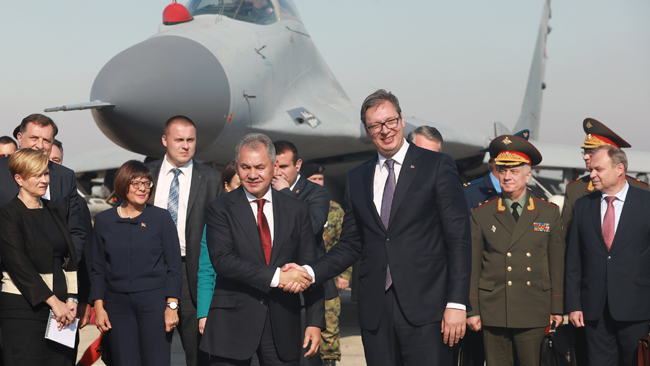A “brother” but not an ally
Belgrade can only offer Kyiv its neutrality
The diplomatic scandal between Ukraine and Serbia, with unprecedented summons of ambassadors and extremely harsh statements of the two countries’ foreign ministries, became a great surprise to many observers. But this was to happen some day. The cause of the conflict – the presence of Serbian mercenaries in the Donbas – is only an episode in the problems of bilateral relations.
As is known, Belgrade does not officially recognize the annexation of Crimea and upholds the territorial integrity of Ukraine. But, in reality, the Serbian leadership is showing no unflagging support to Ukraine in its resistance to Russian aggression. In spite of all declarations, Serbia refuses to vote for UN General Assembly resolutions aimed at supporting Ukraine’s territorial integrity and categorically opposes sanctions against Russia. In an interview with the Russian newspaper Izvestiya on November 13, Serbia’s Vice Premier and Foreign Minister Ivica Dacic confirmed again the continuity of Belgrade’s current foreign-policy course. “We and Russia wish to maintain comprehensive cooperation and friendly relations in the political and economic fields, in research, culture, education, and the matters of defense, security, and military production… Serbia wants to join the EU, but we will never betray our national interests and will never impose sanctions against friends,” the Serbian foreign minister said.
Ukrainian diplomats, politicians, and public seem to have been expecting a friendlier policy towards this country on the part of the “fraternal Serbian people.” But it is clear that what Belgrade can offer Kyiv today at most is a policy of maneuvering between the West and Russia, which the Serbs call neutrality.
Not all the Ukrainians will agree that Serbian mercenaries in the Donbas, voting against the UN “Ukrainian” resolution, and endless assurances of friendship with Russia are a sign of neutrality. But Serbia is not just trying on the “suit” of another Switzerland today – the neutral status of that state has in fact been accepted on the international level. It is for this reason that Belgrade received, for a second time on November 13, Kurt Volker, US Special Representative for Ukraine, and the Russian president’s assistant Vladislav Surkov, who continued to negotiate the ways of stopping the Donbas war.
Can Serbia change its attitude to Ukraine and to the Russian-Ukrainian conflict in the foreseeable future? Only one thing is clear today: essential changes in favor of Ukraine are unlikely. Belgrade does not want to and will not quarrel with Moscow; it will only support Ukraine in a way that will not harm Russia.
In theory, a hint at the likelihood of Ukraine’s recognition of Kosovo could have an impact on Serbian-Ukrainian relations. This would perhaps be an important event for Serbia. But to what extent would this prospect scare Belgrade?
As of today, 113 countries have recognized the Republic of Kosovo, including 25 out of 29 (86 percent) NATO member states, 23 out of 28 (82 percent) European Union member states, and 110 out of 193 (57 percent) United Nations member states. The addition of Ukraine to the latter list will hardly have any far-reaching geopolitical consequences. Firstly, Ukraine is not a member of the UN Security Council and, hence, cannot have a dramatic impact on the destiny of Kosovo (and, accordingly, Serbia). Secondly, neither the current nor the next Ukrainian leadership will ever broach this subject because none of the political forces in Ukraine will support the independence of Kosovo. It’s a hard fact.
There is also another way to improve relations with Serbia. As the Serbian and Ukrainian journalist Boris Varga wittily told me, “Serbia supports Ukrainian fraternity with Russia rather than the Croatian model of Ukraine’s independence.” Accordingly, to make the Serbs take a pro-Ukrainian stand, Ukraine must… make peace with Russia and restore close links with it in all fields. Otherwise, it is futile to expect a strong friendship with Serbia.
In these conditions, Kyiv seems to have only one way to go: to drop such a popular idea as “brotherly friendship,” look the truth in the eyes, and do its best to make the Serbs pursue a really neutral policy about the Russian-Ukrainian conflict.






